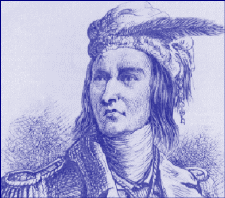|
Tecumseh
There is a consensus among historians that the great Indian
leader, who, it seems, was never designated a chief in his own tribe, was born in 1768.
The village of his birth is in dispute, although many believe the location, (after
recognizing five possibilities and their claims) of birth probably occurred at Old Piqua
on the Mad River, just southwest of Springfield, Ohio. He was one of eight children born
to a Shawnee chief and a part-Creek Cherokee woman. His father died fighting white
settlers at the Battle of Point Pleasant in 1774, under the leadership of Shawnee Chief Cornstalk. His mother returned to her home
village, leaving her children to be raised by the tribe in Ohio.
When the Old Piqua
village was destroyed by General Wayne in 1780, and the
Shawnee moved to the banks of the Great Miami River in Miami County, the 12 year old
Tecumseh was probably with them. In December 1792, with the aid of a dozen warriors, he
defeated a force of almost three times that amount at a location a few miles northwest of Lockington. Tecumseh opposed any consideration that
meant the surrendering of Indian lands to whites. He was a participant in the Battle of Fallen Timbers (1794) that resulted in an Indian
loss and the signing of the Greene Ville Treaty. In
1795, the year of the Greene Ville Treaty, he, and a large contingent of Shawnee were
camped at Deer Creek, southeast of Urbana. He moved back to the Great Miami River (Piqua
area) in 1796, raised a crop of corn, and then moved to the Whitewater River in Indiana.
This move was probably precipitated by the whites efforts to enforce the treaty
relinquishing this part of Ohio over to white settlement.
His brother, Tenskwatawa (The Prophet) preached against
white domination while Tecumseh traveled the eastern seaboard, the Midwest and south
raising support for an Indian coalition. In 1805, Tecumseh, along with his followers moved
into the Greenville area, and established a village in violation of the treaty. The area
settlers campaigned vigorously to have the Indians evicted, and, in 1807, they moved back
to the village at Tippecanoe in Indiana. The Indian defeat at The Battle of Tippecanoe in
Indiana caused a dramatic reduction in support for Tecumseh’s cause by the other
tribes. In the War of 1812, Tecumseh joined the British as an
ally, and after many battle successes they made him a Brigadier General. In 1813, the
great Tecumseh died in the Battle of the Thames River in Canada.

Tecumseh
'Indian' segment written in December, 1997 by David Lodge
[ Back to Indians Index ]
|

